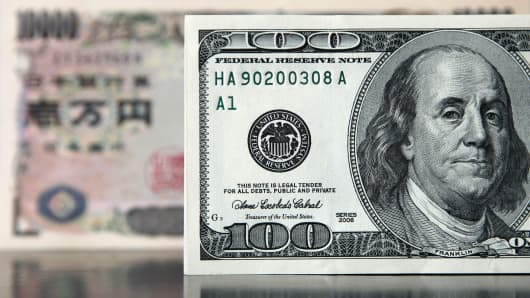Another rally in Japan, with the Nikkei up 2.9 percent, as the dollar reaches 101.4 yen. The Nikkei up 40 percent this year (!).
That dollar/yen moving is putting a lot of pressure on commodities today ... the dollar index is at a two-week high, with gold, silver, copper, oil, and heating oil all down 1.8 to 2.5 percent.
It's not just the yen ... the weekly jobless claims data yesterday also goosed the dollar, as did speculation that The Wall Street Journal would publish an article that the Federal Reserve was going to soon end or drastically cut back its bond purchase program (where is it?).
But things really started moving as the dollar/yen broke 100, which happened around 2 p.m. ET yesterday.










